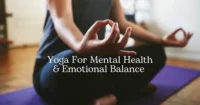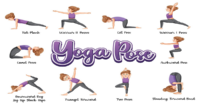Yoga transcends being merely a fitness craze; it’s an age-old discipline that unites the mind, body, and spirit. Despite its widespread acclaim, yoga is often clouded by myths and misunderstandings. These misconceptions may deter individuals from unlocking the numerous benefits it provides. This blog aims to dispel 10 common myths about yoga, offering clarity and encouraging you to embrace this life-changing practice.
Myth 1: Yoga Is Only for Flexible People
Debunked: You don’t need to be flexible to start yoga; in fact, yoga helps you become flexible. It’s a practice for everyone, no matter their starting point. Poses can always be adjusted to match your current range of motion, and consistent effort will gradually enhance your flexibility.
Solution: Start with beginner-friendly poses and focus on consistency rather than perfection. A good yoga instructor will guide you to adapt poses to your current capabilities.
Myth 2: Yoga Is Just Stretching
Debunked: While yoga includes stretching, it is much more than that. Yoga is a holistic practice that combines physical postures (asanas), breath control (pranayama), meditation, and mindfulness.
Solution: Explore various yoga styles, such as Hatha for beginners, Vinyasa for dynamic movement, or Kundalini for spiritual awakening. This will give you a broader understanding of yoga’s diverse benefits.
Myth 3: Yoga Is a Religious Practice
Debunked: Yoga has roots in ancient Indian philosophy, but it is not inherently religious. It’s a spiritual and physical discipline that can be practiced by people of all faiths or none at all.
Solution: Focus on the aspects of yoga that resonate with you, whether it’s improving physical health, reducing stress, or cultivating mindfulness.
Myth 4: Yoga Takes Too Much Time
Debunked: Yoga doesn’t require hours of practice. Even a 10-15 minute daily session can bring significant benefits to your mental and physical health.
Solution: Incorporate short yoga sequences into your routine, such as morning stretches or a quick post-work relaxation session. Apps and online videos can be excellent resources for time-efficient practices.
Myth 5: Men Don’t Do Yoga
Debunked: Yoga is for everyone, regardless of gender. Historically, yoga was practiced primarily by men in its country of origin. Today, men worldwide practice yoga for its physical and mental health benefits.
Solution: Break stereotypes by joining a mixed-gender yoga class or practicing with male friends who enjoy yoga. Highlighting male yoga role models can also inspire others.
Myth 6: Yoga Is Only for the Young People
Debunked: Yoga is adaptable and can be practiced at any age. Seniors, in particular, can benefit from yoga as it enhances mobility, balance, and mental clarity.
Solution: Look for gentle or restorative yoga classes specifically designed for older adults. Chair yoga is another excellent option for those with limited mobility.
Myth 7: You Need Special Gear to Practice Yoga
Debunked: While yoga mats and comfortable clothing are helpful, they are not mandatory. Yoga can be practiced on any clean, non-slip surface, and you can wear whatever makes you comfortable.
Solution: Start with what you have at home. Over time, you can invest in gear that enhances your experience, such as a good-quality mat or yoga blocks.
Myth 8: Yoga Is Only About Physical Fitness
Debunked: Yoga goes beyond physical fitness. It is a comprehensive practice that improves mental well-being, reduces stress, and fosters self-awareness and emotional balance.
Solution: Allocate a small portion of your practice to mindfulness and meditation. Even just a few moments of intentional breathing each day can have profound effects on your mental clarity and inner peace.
Myth 9: Yoga Is Boring
Debunked: Yoga isn’t about achieving perfection; it’s about embracing progress and uncovering your true self. Each person’s journey in yoga is deeply personal, with the emphasis placed on continuous growth rather than flawless execution of poses.
Solution: Experiment with different yoga styles until you find the one that excites and energizes you. Group classes, workshops, or online challenges can also add variety to your practice.
Myth 10: You Must Be Perfect at Yoga
Debunked: Yoga is not about perfection; it’s about progress and self-discovery. Every practitioner’s journey is unique, and the focus should be on growth, not achieving picture-perfect poses.
Solution: Embrace the idea that yoga is a personal journey. Celebrate small victories, and remember that every pose and practice session contributes to your well-being.
Conclusion
Yoga is a versatile and inclusive practice that offers something for everyone. By debunking these 10 common myths about yoga, we hope to inspire you to explore yoga without reservations or misconceptions. Whether you’re seeking physical strength, mental clarity, or emotional balance, yoga can be a powerful tool to transform your life. So roll out your mat, take a deep breath, and begin your journey today!


